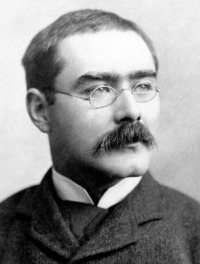
Born: Not Found
Died: Not Found
Region: Not Found
Address: Not Found
Biography:
Joseph Rudyard Kipling was a journalist, short-story writer, poet, and novelist. Kipling's works of fiction include The Jungle Book (1894), Kim (1901), and many short stories, including The Man Who Would Be King (1888). His poems include Mandalay (1890), Gunga Din (1890), The Gods of the Copybook Headings (1919), The White Man's Burden (1899), and If— (1910). He is regarded as a major innovator in the art of the short story; his children's books are classics of children's literature; and one critic described his work as exhibiting "a versatile and luminous narrative gift". Kipling was one of the most popular writers in the United Kingdom, in both prose and verse, in the late 19th and early 20th centuries. In 1907, at the age of 41, he was awarded the Nobel Prize in Literature, making him the first English-language writer to receive the prize, and its youngest recipient to date. He was also sounded out for the British Poet Laureateship and on several occasions for a knighthood, both of which he declined.
Rudyard Kipling used the word ‘grinch’ over 60 years before Dr Seuss. The word ‘grinch’ was used by Rudyard Kipling in his 1892 poetry collection, Barrack-Room Ballads, in ‘The Lament of the Border Cattle Thief’: ‘It’s woe to bend the stubborn back / Above the grinching quern, / It’s woe to hear the leg bar clack / And jingle when I turn!’ Dr Seuss would take up the word for his classic 1957 children’s book, How the Grinch Stole Christmas. (More Dr Seuss facts here.)
His first name wasn’t Rudyard. It was Joseph. The name Rudyard – literally, ‘red yard’ – was taken from Rudyard Lake in Staffordshire, but it was Kipling’s middle name, rather than his first. However, he would be known by the name Rudyard rather than Joseph, and it was the altogether more distinctive Rudyard which Kipling chose to adorn the covers of his books, from the late 1880s when his first volume of short stories appeared (while Kipling was still only in his early twenties).
His first name wasn’t Rudyard. It was Joseph. The name Rudyard – literally, ‘red yard’ – was taken from Rudyard Lake in Staffordshire, but it was Kipling’s middle name, rather than his first. However, he would be known by the name Rudyard rather than Joseph, and it was the altogether more distinctive Rudyard which Kipling chose to adorn the covers of his books, from the late 1880s when his first volume of short stories appeared (while Kipling was still only in his early twenties).
He used the idea of the ‘daemon’ over half a century before Philip Pullman. Kipling claimed that a ‘Daemon’ helped him to write The Jungle Book, which is probably his most famous work. In his final book, the autobiography Something of Myself, he wrote: ‘When your Daemon is in charge, do not try to think consciously. Drift, wait, and obey.’ This ‘Daemon’ is a part of the author’s personality which seems to take over and ‘dictate’ the story to the writer.
In 2013, many of his poems, which had long been thought lost, were published. American scholar Thomas Pinney unearthed over 50 previously unpublished poems by Kipling, which were published in 2013.
Product successfully Added!

